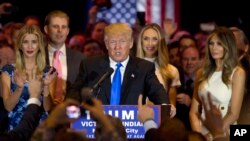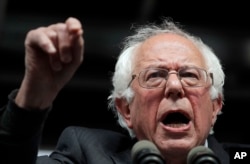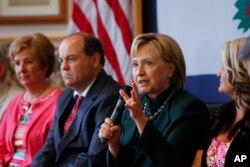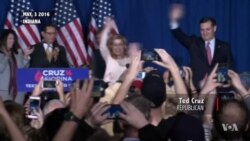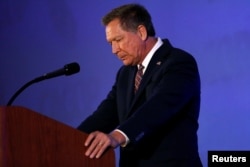When Donald Trump entered the Republican presidential race, national polls showed him trailing a large group of seasoned politicians who served multiple terms as state governors or were sitting U.S. senators. On Tuesday night, he completed a 10-month march through them all and set up a likely general election matchup with former Secretary of State Hillary Clinton.
"Trump has shocked the entire political establishment, and this is not just the Republican establishment, it’s the commentators, the folks who think they know what’s going on," opined Paul Helmke, a professor at Indiana University Bloomington's School of Public and Environmental Affairs. "This is really an amazing story. It’s a scary story to a lot of people, but he’s tapped into something and the Indiana race showed it."
Trump's victory in the Indiana primary put him in a position where he can earn enough delegates to clinch the party's nomination before its convention in July.
Texas Senator Ted Cruz and Ohio Governor John Kasich had been trying to earn every possible delegate in a bid to stop Trump, but their failure led to Cruz dropping out of the race Tuesday night. Kasich has no chance of earning a majority of delegates and is still competing in hopes of somehow forcing an open convention.
"I think what’s happened is that a lot of folks think that government isn't working for them, government isn't effective anymore, they're angry, they want somebody who promises that they can make a difference, and Trump’s somebody who says I can make the deal, I can make this happen, and I think that’s what he’s tapping into," Helmke told VOA.
Clinton vs Sanders
Vermont Senator Bernie Sanders, who faces long odds of catching Clinton in the Democratic race, also won in Indiana as he presses on in his campaign vowing to remain until the end.
Helmke said Sanders is in a way the Democratic mirror to Trump, and that his ability to win in Indiana shows that Clinton has not quite wrapped up the nomination. He also described a distinct difference in how members of each party view their choices.
"I think a lot of the Democrats still think that Clinton is somebody they can go to if Sanders drops out eventually or isn't the nominee. I think part of Cruz’s problem is a lot of people who didn't like Trump didn't like Cruz either."
Republican National Committee Chairman Reince Priebus declared Trump the party's presumptive nominee Tuesday night and said the party needs to unite to defeat Clinton.
Matt Dallek, an assistant professor at George Washington University's Graduate School of Political Management, said the critical question in this election is the extent to which Republicans follow that rallying call to Trump.
"The chairman of the RNC coming out and saying he’s the presumptive nominee [is] not insignificant, but that doesn't necessarily persuade Jeb Bush and Ted Cruz and John Kasich and the Lindsey Grahams of the world to endorse him or to certainly appear on the convention stage," Dallek told VOA. "It’s hard to imagine Ted Cruz endorsing him after all of the things that he said about Trump."
Graham has been a particularly outspoken opponent of Trump, who trails Clinton in general election polls.
"If we nominate Trump, we will get destroyed ... and we will deserve it," Graham tweeted Tuesday.
WATCH: Ted Cruz suspends campaign
Dallek said one thing to watch during the rest of the campaign is what happens with Republicans in the House and Senate who are facing competitive races of their own and have to decide whether to stand by Trump or distance themselves from him.
In the past few weeks Clinton has included in her campaign speeches appeals to Sanders supporters, telling them there is much more that unites them than divides them going forward.
Dallek said Clinton, while ahead in polls, is a "deeply flawed candidate" who has to continue those overtures.
"I think that if Republicans had nominated John Kasich or Rubio she would be the underdog right now and the numbers would be flipped, and that she would probably lose," he said.
Dallek added that he does not want to underestimate the challenges facing the Clinton campaign, but that at this point he would much rather be the head of the Democratic Party than the head of the Republican Party.
The state primaries and caucuses largely involve people who identify themselves as members of the two parties, but more important for the general election is the larger chunk of independent voters who lie in between.
"Independents are going to be crucial here," Helmke said. "There’s a lot of people who are unhappy with government, are very concerned about the future of the country, concerned whether there’s going to be jobs for themselves or for their children or their grandchildren, concerned about America’s role in the world, concerned about terrorism and safety, and those are the voters who could go either way."
WATCH: Political correspondent Jim Malone summarizes the primary:
Looking forward
Dallek said it will be difficult for Trump to run a campaign that moves away from the misogynistic, anti-immigrant and anti-Muslim messages that got him to the Republican nomination.
"If Trump suddenly becomes a very different candidate and a very different person, has a kind of personality transplant, then you could potentially see him appealing to moderates and independents and some of the Republicans who are deeply opposed to him. But if he were to do that, then he would dilute and probably destroy in a sense the things that got him here and he would look like just another feckless politician who is trying to change his stripes and his message."
The general election campaigns will not officially begin until each party holds its convention in July. Before then, nine more states will hold their contests and allocate the remaining delegates.




